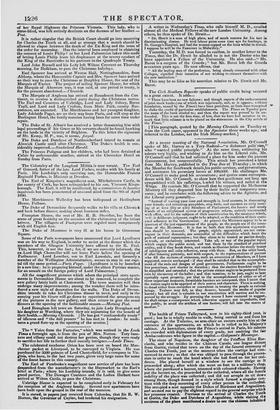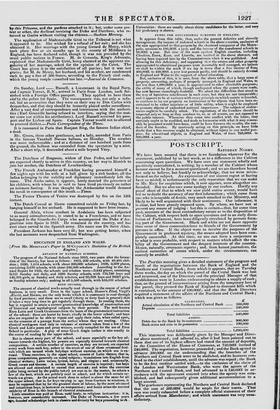The health of Prince Talleyrand, now in his eighty-third year,
is good ; but he is wholly unable to walk, being carried to and from his carriage. At the Tuileries, an arm-chair on castors awaits him at the entrance of the apartments, on which he is rolled to his Majesty's cabinet. As heretofore, since the Prince's arrival in Paris, his saloons are crowded with diplomatists of every grade, not omitting the fast Ambassitdresses who figure in the capital.— Galignani's Messenger.
The niece of Napoleon, the daughter of the Prideess Elise Bac- ciochi, and who resides in the Château Canale, one league distant from Goritz, visited that town on the day of the funeral ceremony of Charles the Tenth, just at the moment when the cortege bad corn- s, menced to move ; so that she was obliged to pass through the proces- sion in order to reach the hotel which she had fixed on for her resi- dence. She placed herself at a window to see the cortege as it proceeded along; after which she went on foot to a milliner's shop, where she purchased a bonnet, trimmed with coloured ribands. Having put the bonnet on, she proceeded to the cathedral, where all the female nobility of the place was collected ; and did not scruple to sit down among them, though dressed in a style which formed a singular con- trast with the deep mourning of every other person in the cathedral. She occupied a seat opposite the Dukes of Bordeaux and Angoulem. e, and seemed not to pay the slightest regard to the general surprise which her presence created. Previous to the arrival of Charles the Tenth at Goritz, the Duke and Dutchess of Angouleme, while visiting the environs of the place manifested a desire to see the chiteau inhabited by this Princess, and the gardens attached to it ; but, under some pre- text or other, she declined receiving the Duke and Dutchess, ho re- turned to Goths without visiting the chateau.—Suabian Mercury.
The application of Mademoiselle Grisi to the Tribunal is not what it appeared to be. She wished for a refusal of her suit ; and she has obtained it. Her marriage with the young Gerard de Mercy, which took place five or six months ago in the county of Middlesex in England, has been declared valid, though it was not preceded by the usual public notices in France. M. de Gerando, King's Advocate, explained that Mademoiselle Grisi, being alarmed at the apparent sin. gularity of her marriage, asked for the opinion of the Court, The Court has given it to the satisfaction of all parries; but it was not gratis; for M. de Mercy, her husband, and his mather, are condemned each to pay a fine of 500 francs, according to the French civil code, which the young couple consulted too late.—Journal du Commerce.



























 Previous page
Previous page